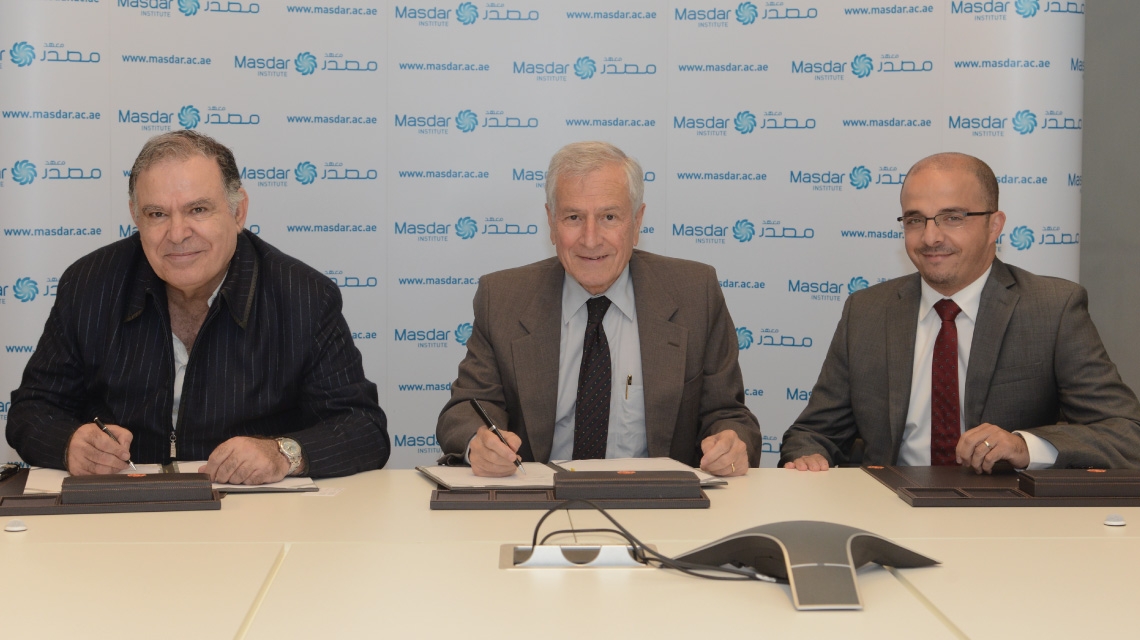
Abu Dhabi-UAE: 21 December, 2014 – Masdar Institute of Science and Technology, an independent, research-driven graduate-level university focused on advanced energy and sustainable technologies, and the UAE-based Engineering Solutions (ENGSL) Minerals, leaders in engineering technologies solutions, today announced they have signed a collaboration agreement to work closely on testing and evaluating energy-efficient technologies for carbon dioxide capture and conversion.
The agreement was signed by Dr. Fred Moavenzadeh, President, Masdar Institute, and Badri Ghais, Chairman ESL FZC, parent company of ENGSL. The ceremony at the Masdar Institute campus was attended by Hamza Kazim, Vice-President, Operations and Finance; Dr Steven Griffiths, Executive Director, Institute Initiatives; Dr. Mohammad Abu Zahra, Associate Professor, Chemical Engineering, Masdar Institute; and Olfi Mohammed, Managing Director, ENGSL.
According to the agreement, the 30-month project will test and evaluate the possible application of fly ash and modified fly ash for the capture and utilization of CO2 from flue gas. For the UAE and the GCC region, this technology could be an alternative to the conventional CO2 capture technologies with the option to utilize part of the CO2 for enhanced oil recovery purposes.
In addition, the integration between this technology and desalination plants is feasible through the use of reject brine, which will be further developed and investigated by this project. Furthermore, the economic feasibility of this technological route for CO2 capture and utilization will be carried out, according to the agreement.
Dr. Fred Moavenzadeh said: “The agreement with ENGSL Minerals reflects our commitment to focus our research on innovation in areas relevant to the UAE and the region, especially in the energy sector. We are grateful for the support of the country’s leadership that has encouraged us in all our research activities, especially those that aim to achieve sustainable solutions. We believe this agreement will pave the way for achieving energy-efficient technologies.”
Badri Ghais said: “The agreement with Masdar Institute bears testimony to our credentials as a company that has patented technologies in the carbon capture area. This will pave way for ESL to seek more sustainable solutions through working with our partners. We hope the project with the research-based institution will help achieve more efficient technologies that will benefit the wider global community.”
Two faculty, a post-doc, a PhD student and two MSc students will be involved with this project that will be led by Dr. Abu Zahra. ENGSL currently holds two patents on this technology and is currently operating a large-scale pilot plant in Norway, funded jointly with the Norwegian government. The company, which has developed, tested and patented its technologies for carbon capture and its transformation into soda chemicals, is also trying to establish large-scale production using this technology in the UAE. The technology development and testing will be carried out at Masdar Institute, which has established the needed laboratory instruments for such a project with a generous support from ENGSL. In addition, ENGSL will construct a pilot scrubber test column at their facilities to test this technology jointly with Masdar Institute within the scope of the current project.
Masdar Institute is intensely involved in energy-related research activities that bring multiple benefits to the UAE and the region. Carbon capture, transport, utilization and storage activities contribute to the overall vision of Abu Dhabi to reduce greenhouse gas (GHG) emissions. For the UAE, carbon capture, utilization, and storage (CCUS) has the potential to serve as the right medium for enhanced oil recovery (EoR).